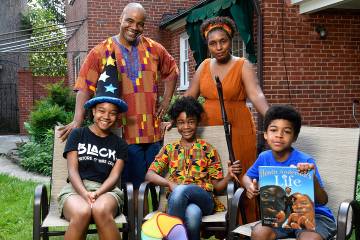Shani Tahir Mott, lecturer in the Center for Africana Studies and Department of History at Johns Hopkins University, died of cancer on March 12, four days before her 48th birthday.

Image caption: Shani Mott
Mott was an interdisciplinary scholar of the ways racial language and ideas about race get formed by writers as well as by political structures and institutions. Her dissertation focused on how mid-20th century writers of fiction and nonfiction strategically deployed racial language in American popular culture, exploring complex questions of sexuality, economic inequality, and political power. Those questions evolved into an exploration of how institutions—including foundations, universities, and governments—shape what race means and how power works. She asked, for example, how do foundations shape academic research through funding priorities? How does Johns Hopkins record or remember the experiences of its Black staff and contract workers? How does a teacher inspire students to see how race and power work on their campus or in their world?
Throughout her career, Mott's research added layers and nuance to the story of the emergence of the field of Black Studies and to the campus community. Her probing questions and insistence on thoroughness and rigor brought out new depths of scholarship in those she influenced as she urged them to consider uncharted and complex angles.
Minkah Makalani met Mott almost 20 years ago but got to know her better—along with her husband, Hopkins history professor Nathan Connolly—when he arrived at the Krieger School of Arts and Sciences as director of the Center for Africana Studies in 2021.
"Shani welcomed my family into her home and made us feel a part of her and Nathan's circle of close friends, which is to say, she made us feel like family," Makalani said. "In this all too brief time, she also displayed a generosity of heart that was matched by a generosity of intellect. A constant presence and member of the Center for Africana Studies faculty, her spirit and thoughtfulness were always on display in how she engaged our work, mentored her students, and did the hard work of helping build the center. She always displayed the best qualities of Black Study, insisting that we join the demanding scholarly standards of the field with a commitment to the socio-political concerns of Black people beyond the academy. Shani Mott's value to the Center for Africana Studies cannot be underestimated. But it is her smile, laughter, and her friendship that will be missed most by myself and my family."
Tara Bynum, who earned a PhD in the Krieger School's Department of English in 2009 and is now assistant professor of English and African American Studies at the University of Iowa, credits the existence of her recent book to conversations around Mott's kitchen table, talking about ideas that helped her consider who her work was meant to serve and whether she was willing to tell a story that hadn't been told.
"What I will miss in talking with her is this reminder to look deeper and be willing to ask the questions that might lead to messy answers," Bynum said. "Shani was thoughtful in almost every way—as a friend, as an intellectual, and as an interlocuter. She had an exceptional wit, which allowed her to get to the heart of the matter, whatever that might be. She was always good at asking the most difficult question of the moment in different arenas, whether in the history department's Black World Seminar or in conversation with friends talking about life. She knew how to show up."
In addition to her roles in Africana Studies and history, Mott championed social justice and equity at Johns Hopkins through service on numerous committees and entities. From 2018 to 2019, she served as co-principal investigator of the Housing Our Story Project, designed to redress the absence of Black staff and contract worker voices in the Homewood campus archives. She helped launch the university's first social justice and equity collective; curated a library exhibit on expressions of Black freedom; and served on the Homewood Council on Inclusive Excellence's Diversity Education and Inclusive Classrooms subcommittee, among other activities.
"Professor Mott was a deeply respected and beloved scholar and mentor," said Christopher S. Celenza, dean of the Krieger School. "Her important research, as well as her commitment to the Center for Africana Studies and to helping the university become the best version of itself possible, have made a lasting impact."
Added Stuart Schrader, associate research professor in the Center for Africana Studies: "Dr. Shani Mott was a luminous presence on campus and an integral member of our community in Baltimore and at Johns Hopkins University. Her students adored her, and they consistently found her teaching inspiring. For the past few years, my office has been adjacent to Shani's, and I always knew that whenever I saw her, it would brighten my day. When we crossed paths, I was guaranteed to laugh and leave with a smile on my face."
Also see
Mott's social justice work extended as well to the wider Baltimore community—she launched and co-chaired a diversity initiative at The Bryn Mawr School and planned curriculum for Orita's Cross Freedom School.
"Shani was an innovative and dedicated teacher, a generous colleague, a creative and interdisciplinary thinker, and a luminous presence on campus," said Tobie Meyer-Fong, chair of the history department. "She found joy and meaning in her work with students; they, in turn, were inspired by her commitment to them."
Before coming to Johns Hopkins in 2008, Mott taught in Barry University's English department while directing its Africana Studies program. She designed secondary school curriculum with a focus on racial literacy and American literature, and consulted on teaching and mentoring. She earned a bachelor's degree in African American Studies and English from Wesleyan University in 1998, and a PhD in American Culture from the University of Michigan in 2005. She was a master teacher in Liberal Studies at NYU, held a postdoctoral fellowship in English at Hopkins, held an Erskine A. Peters Dissertation Fellowship at the University of Notre Dame, and was a Mellon-Mays Undergraduate Fellow. She received Hopkins' Voices of Color Faculty Award, MOCHA in 2019.
Mott is survived by her husband; their three children, London, Clarke, and Elijah; and colleagues and friends across the Krieger School and beyond.
"Shani was a warm and generous scholar, teacher, friend, and loved by many in the department," said Jessica Marie Johnson, associate professor in the history department. "She challenged us to be better and more ethical colleagues and friends; she stood up for justice in every sense of the word and did not shy away from hard truths. The love between her and Nathan was a thing of beauty; it warmed every room they were in, together or apart. She will be missed."
Tagged obituary, africana studies








